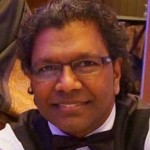Strangling A Democracy – Collectively

By Suren Rāghavan –May 1, 2016
All states have nations. However, all nations may not have a state. A bitter political reality the Tamil separatists should get into their political psyche and come to live with. This is not to deny the Rowlinian justice to a ‘minority’ nation that has lived and struggled for their political freedom with huge historical human and cultural cost: but to negotiate with the global, regional and contemporary national strategic/security realities within the Lankan context. In the same breath one must reiterate to the extreme Sinhala nationalists and their often violent ethnoreligious politics- that oppressing and continuing to deny the fundamental political freedom and the inalienable rights of a nation within their majoritarian ethnic state with such historicized centripetal interpretation and mobilization of ‘superiority’ political power, will not only work as a barrier to the stability of their own ‘Dhammadīpa’ but in fact will be a self-constructed destroyer within a postwar context even with the new found limited opportunities for the recovery of a working democracy.
There are two popular, often asked questions aiming to analyze the bi-polar positions that leads to the structural crisis within the state of Lanka. 1) Why is the nation of Sinhalas, which claims to be the bearers of the pristine Buddhist doctrine cannot construct harmony but take violent paths in their political conflict resolution? 2) Why are the ‘moderate’ Tamil intellectuals silent and disengaged in the face and history of the separatist discourse? The answers vary based on who is asked of, because the questions are raised on false or lopsided conceptual notions of important terms here.
One needs to ask which ‘Buddhism’ are you comparing to conclude that Sinhalas live in contrary and does your ‘moderate intellectuals’ mean those who deny the rights of the Tamils for their self-determination even leading to a separation if such is possible (non-violently)? Because searching for a historical pure Buddhism and come to conclude that it is ‘betrayed’ in Lanka is a ‘Tambiahian’ paradigm constructed and propagated well within a Western/ Protestant understanding of Buddhism. Sinhala Buddhism had never been what is termed as Pāli Buddhism. Instead it arrived, established and continues as a political process of redefining the past, present and future of the Sinhala ethnic nation and their structural power aspirations. For this reason Buddhism is the means not the end within the Sinhala political hegemony against the ‘Asinhalas’ sharing the island. Similarly if a Tamil is considered a moderate because s/he openly stand to oppose the idea of an independent sovereign state for the Tamils carved from the territorial boundaries of present Lanka, then you are not only dismissing the fundamental aspects of modern democracy but also contemporary understanding of collective Human Rights guaranteed by the International Convention on Civil and Political Rights. This makes an a paradigmatic approach to the intellectual discourse of the ethnoreligious and ethnolinguistic nationalisms of Sinhalas and the Tamils respectively – a sociopolitical funambulism. Yet one cannot be silent far too long in the face of the abysmally decomposing democratic nuances even under a so called ‘Rule of Good Governance’

